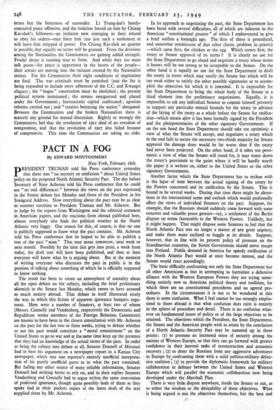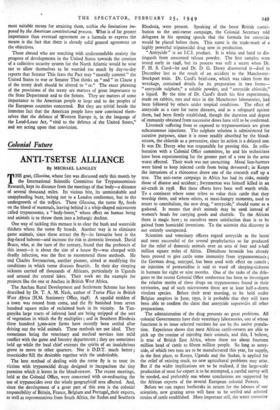PACT IN A FOG
By EDWARD MONTGOMERY New York, February 18th.
pRESIDENT TRUMAN told his Press conference yesterday that there was " no mystery or confusion " about United States policy on the proposed North Atlantic Security Pact. The day before Secretary of State Acheson told his Press conference that he could see " no real differences " between the views on the pact expressed.. in the Senate debate last Monday and those of the President in his Inaugural Address. Now everything about the pact may be as clear as summer sunshine to President Truman and Mr. Acheson. But to judge by the reports from Washington and the editorial comment in American papers, and the reactions from abroad published here, almost everybody else finds the political weather in the North Atlantic very foggy. One reason for this, of course, is that no one is publicly supposed to know what the pact contains. Mr. Acheson told his Press conference that he hoped to be able to publish a text of the pact " soon." That may mean tomorrow, next week or next month. Possibly by the time this gets into print, a week from today, the draft text will have been published, and then at least everyone will know what he is arguing about. But at the moment of writing everyone who discusses the pact in public is in the position of talking about something of which he is officially supposed to know nothing.
The result has been to create an atmosphere of unreality about all the open debate on the subject, including the brief preliminary skirmish in the Senate last Monday, which seems to have aroused so much anxiety abroad. That debate in itself illustrated nicely the way in which this fiction of apparent ignorance hampers argu- ment. Here were a number of Senators, at least two of whom (Messrs. Connally and Vandenberg, respectively the Democratic and Republican senior members of the Foreign Relations Committee) are known to have been in the closest consultation with Mr. Acheson on the pact for the last two or three weeks, trying to debate whether or not the pact would constitute a " moral commitment" on the United States to go to war and at the same time keep up the pretence that they had no knowledge of the actual terms of the pact. In order to bring the subject into debate at all, Senator Donnell of Missouri bad to base his argument on a newspaper report in a Kansas City newspaper, which was one reporter's entirely unofficial interpreta- tion of his purely unofficial guess as to what the pact contained. But failing any other source of more reliable information, Senator Donnell had nothing better to rely on, and in their replies Senators Vandenberg and Connally had to argue within the same convention of professed ignorance, though quite possibly both of them as they spoke had in their pockets copies of the latest draft of the text supplied them by Mr. Acheson. In its approach to negotiating the pact, the State Department has been faced with several difficulties, all of which are inherent in the American " constitutional process " of which I endeavoured to give a brief outline a fortnight ago. The first of these is procedural, and somewhat reminiscent of that other classic problem in priority —which came first, the chicken or the egg. Which comes first, the treaty or Senate approval of its terms ? It is clearly no use for the State Department to go ahead and negotiate a treaty whose terms it knows will be too strong to be acceptable to the Senate. On the other hand it is equally no use for the State Department to draft the treaty in terms which may satisfy the Senate but which will be too weak either to satisfy the other possible signatories or to accom- plish the objectives for which it is intended. It is impossible for the State Department to bring the whole body of the Senate as a third element into the preliminary negotiations. Equally, it is impossible to ask any individual Senator to commit himself privately to support any particular textual formula for the treaty in advance of the liying of the treaty as a whole before the Senate for ratifica- tion—which means after it has been formally signed by the President and the plenipotentiaries of the other signatory Governments. If on the one hand the State Department should take too optimistic a view of what the Senate will accept, and negotiates a treaty which in the end fails to secure the necessary two-thirds majority for Senate approval the damage done would be far worse than if the treaty had never been projected. On the other hand, if it takes too pessi- mistic a view of what the Senate will stand for, it may water down the treaty's provisions to the point where it will be hardly worth the paper it is written on, either to the United States or the other signatory Governments.
Another factor which the State Department has to reckon with is the lapse of time between the actual signing of the treaty by the Powers concerned and its ratification by the Senate. This is bound to be several weeks. During that time there might be altera- tions in the international scene and outlook which would profoundly affect the views of individual Senators on the pact. Suppose, for example, that the Russians should suddenly come forward with some concrete and valuable peace gesture—say, a settlement of the Berlin dispute on terms favourable to the Western Powers. Unlikely, but it might happen. That might dispose some Senators to feel that the North Atlantic Pact was no longer a matter of any great urgency, and make them more inclined to boggle at its details. Suppose, however, that in line with its present policy of pressure on the Scandinavian countries, the Soviet Government should move troops into Finland. Public demand in America for speedy ratification of the North Atlantic Pact would at once become intense, and the Senate would react accordingly.
The basic difficulty confronting not only the State Department but all other Americans is that in attempting to formulate a defensive alliance with the Western European Powers they are trying some- thing entirely new to American political theory and tradition, for which there are no constitutional precedents and no agreed pro- cedures. In the circumstances it is not to be wondered at that there is some confusion. What I feel cannot be too strongly empha- sised to those abroad is that what confusion does exist is entirely in the sphere of procedure and detail. There is no confusion what- ever on fundamental issues of policy or of the large objectives to be attained. The objectives which the President, the State Department, the Senate and the American people wish to attain by the conclusion of a North Atlantic Security Pact may be summed up in three points: (t) to promote an increased sense of security among the nations of Western Europe, so that they can go forward with greater confidence in their internal tasks of reconstruction and economic recovery ; (a) to deter the Russians from any aggressive adventures in Europe by.confronting them with a solid politico-military defen- sive coalition ; (3) to provide the diplomatic framework for military collaboration in defence between the United States and Western Europe which will parallel the economic collaboration now being developed under the Marshall Plan.
There is very little dispute anywhere, inside the Senate or out, as to either the wisdom or the desirability of these objectives. What is being argued is not the objectives themselves, but the best and
most suitable means for attaining them, within the limitations im- posed by the American constitutional process. What is of far greater importance than eventual agreement on a formula to express the means is the fact that there is already solid general agreement on the objectives.
Those abroad who are watching with understandable anxiety the progress of developments in the United States towards the creation of a collective security system for the North Atlantic would be wise not to allow themselves to be worried too much by day-to-day reports that Senator This fears the Pact may "morally commit" the United States to war or Senator That thinks an " and " in Clause 5 of the treaty draft should be altered to " or." The exact phrasing of the provisions of the treaty are matters of great importance to the State Department and to the Senate. They are matters of some importance to the American people at large and to the peoples of the European countries concerned. But they are trivial beside the immense fact that the American people have now convinced them- selves that the defence of Western Europe is, in the language of the Lend-Lease Act, "vital to the defence of the United States," and are acting upon that conviction.



































 Previous page
Previous page